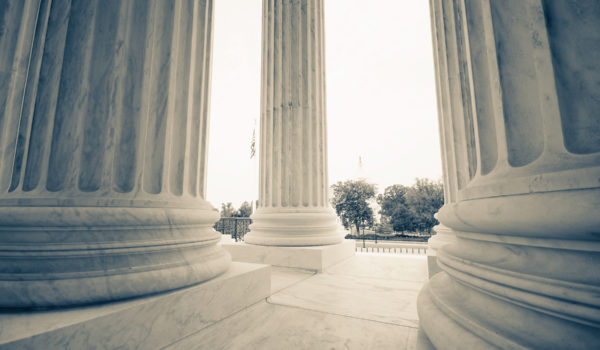Coinbase, Inc. v. Bielski, 143 S. Ct. 1915 (June 23, 2023)
In Coinbase, Inc. v Bielski, a 5-4 U.S. Supreme Court ruled that all trial court proceedings, including discovery, must be automatically stayed whenever a party appeals from a pretrial order denying a motion to compel arbitration.
The Federal Arbitration Act (FAA) gives parties who seek to compel arbitration in lieu of federal court litigation a statutory right to immediately appeal an order refusing to send the case to arbitration. This is an exception to the ordinary rule that parties cannot appeal pretrial decisions until the case is over. However, the FAA does not expressly address whether the litigation may continue to proceed in the trial court while the question of arbitrability is addressed on appeal. The federal circuit courts were divided on the issue, with some holding that all pretrial proceedings should be automatically stayed whenever arbitrability is appealed, and others holding that whether to stay proceedings under those circumstances was discretionary with the trial court.
Writing for the Court, Justice Kavanaugh—joined by Chief Justice Roberts and Justices Alito, Gorsuch, and Barrett—ruled a stay is automatic under the FAA. While the FAA is silent on whether trial court proceedings should be stayed pending appeal of arbitrability, the majority concluded that Congress had enacted the FAA’s appeal provisions against the “background principle” of law set forth in Griggs v. Provident Consumer Discount Co., 459 U.S. 56, 58 (1982), which maintains that an appeal ordinarily divests the district court of jurisdiction “over those aspects of the case involved in the appeal.” The majority held that “[t]he Griggs principle resolves this case,” because the issue in an arbitrability appeal is whether any activity should occur in the district court or instead in arbitration. As such, conducting any pretrial proceedings implicates the issue on appeal.
The majority reasoned that Congress’ awareness of this rule supported an inference that “[w]hen Congress wants to authorize an interlocutory appeal and to automatically stay the district court proceedings during that appeal, Congress need not say anything about a stay.” Conversely, when Congress does not intend an interlocutory appeal to stay the trial court proceedings, it says so expressly.
The majority also stated this rule was necessary to preserve the asserted cost and efficiency benefits of arbitration. The Court reasoned that requiring parties to engage in district court discovery and other proceedings while appealing arbitration would irrevocably deny the appellant the very benefits that an arbitration agreement was intended to provide.
In an unusually strident dissent for a procedural issue of this kind, Justice Jackson—joined by Justices Kagan, Sotomayor, and in part by Justice Thomas—harshly criticized the majority’s adoption of a “supercharged version of Griggs” that “comes out of nowhere” in the Court’s prior precedents. According to the dissent, Griggs only prevents the district court from conducting proceedings that might modify or alter the specific order on appeal, but it should not prevent pretrial discovery on the merits that did not relate to the specific question of arbitrability. The dissent likened the majority’s solicitousness of defendants seeking to compel arbitration to the “give an inch, take a mile” problem displayed in the children’s book, “If You Give a Mouse a Cookie”: parties would likely seek to exploit the decision’s logic to use all manner of interlocutory appeals to stall cases and wait out plaintiffs who cannot afford significant delays in pursuing their claims. The dissent ominously concluded, “The Court today ventures down an uncharted path—and that way lies madness.”
Key Takeaways
- When a party appeals a district court’s pretrial decision denying a motion to compel arbitration under the FAA, all district court discovery and other proceedings must automatically be stayed until the appeal is concluded.
- The majority opinion in Coinbase arguably creates a broader presumption that district court proceedings should be automatically stayed pending any statutory interlocutory appeal (particularly where the appeal involves some question about the appropriate forum for the case), unless the statute authorizing the appeal expressly provides that no automatic stay is intended.
Want more U.S. Supreme Court coverage?
Explore the full wrap-up and analysis from our Appellate Practice Group on the most consequential rulings for businesses and industries during the 2022-2023 U.S. Supreme Court term.

